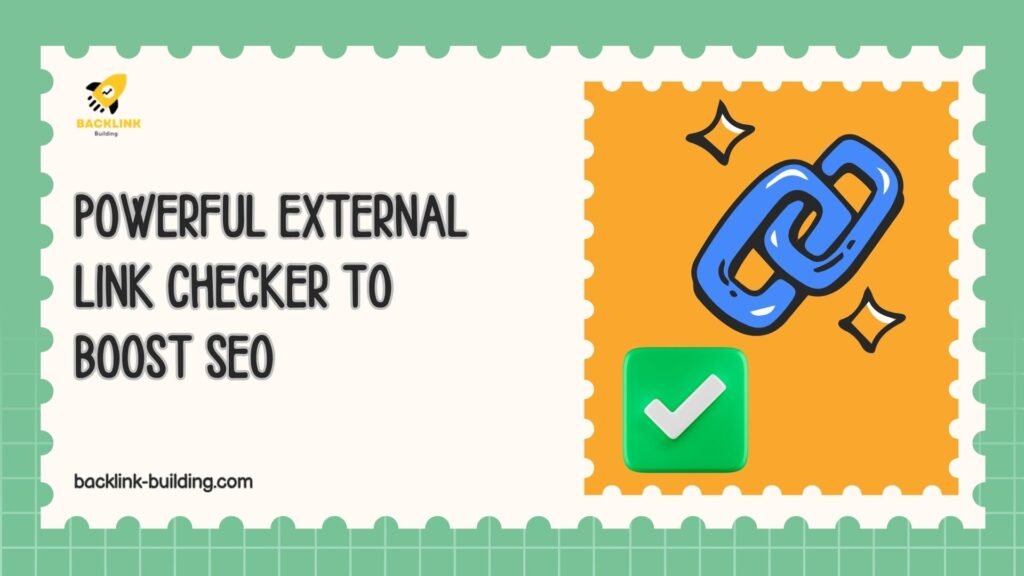
Do you want your website to rank better on Google? Then you need to pay attention to something very important—your external links. These are the links on your website that point to other websites.
It might seem like a small thing, but they can really affect how your website performs. If your external links are broken or lead to low-quality websites, it can hurt your SEO. That is why you need a good external link checker.
In this guide, we will talk all about external link checkers, why they matter, and how you can use them to boost your SEO.
What Is an External Link?
Let us start with the basics.
An external link is a link that points from your website to another website. For example, if you are writing a blog post and you link to a news article or a research paper on another site, that is an external link.
These links help your readers learn more. But more than that, they also show Google that you are linking to helpful and trusted content. That helps with your SEO.
Why External Links Matter for SEO
External links are a big deal for a few reasons:
- They show that you have done your research
- They help your readers find more information
- They connect your content to high-quality sources
- They build trust with your audience
But here is the thing. Not all external links are good. Some can do more harm than good. For example:
- A broken link leads to a page that no longer exists
- A link to a spammy site makes your site look untrustworthy
- A page that is too slow to load can hurt user experience
This is where an external link checker becomes super useful.
What Is an External Link Checker?
An external link checker is a tool that checks all the links on your website that point to other websites. It tells you if any links are:
- Broken
- Redirected
- Slow to load
- Linking to low-quality or spammy domains
Think of it like a spell checker, but for your links. It helps you clean things up, fix issues, and make sure your site looks professional and reliable.
How an External Link Checker Helps SEO
You might wonder how checking links can help your SEO. Here is how:
1. Improves User Experience
Nobody likes clicking on a link that does not work. It feels frustrating and confusing. If your website has broken links, users might leave your site quickly. That sends a signal to Google that your content is not helpful.
2. Keeps Your Website Trustworthy
If your site links to poor-quality websites, it can hurt your reputation. A good link checker will catch those and help you remove or replace them.
3. Boosts Your Site Health
Google wants to send users to websites that work well. If your site has broken links or redirects everywhere, it makes your site look messy. An external link checker helps clean up your site.
4. Helps with Technical SEO
Even though we are keeping things simple here, technical SEO is still important. Broken links are one of the things that search engines look at. If you fix those links, your overall SEO score can improve.
Signs You Need an External Link Checker Tool
Not sure if you need one? Look out for these signs:
- You have a lot of content and do not remember where all your links go
- You updated old blog posts but forgot to check the links
- Some pages load slowly or give 404 errors
- You get feedback from users saying a link does not work
- Your SEO score is dropping and you are not sure why
If any of these sound familiar, it is time to use a link checker.
What to Look for in an External Link Checker Tool
There are many tools out there. But not all are the same. Here are some things to look for when picking a good external link checker:
- Easy to use – The tool should be simple, even for beginners
- Fast scanning – You should not have to wait hours for results
- Detailed reports – It should show which links are broken and where they are
- Export option – So you can download and fix issues later
- Spam link detection – It should flag links to harmful or shady websites
Best External Link Checker Tools You Can Try
Let us look at some of the best tools that can help you:
1. Ahrefs Site Audit
Why it’s great:
Ahrefs does more than backlinks—it checks external links too. The Site Audit tool tells you if you have broken external links, redirects, or links pointing to shady sites.
Best for:
SEO professionals, digital marketers, and webmasters.
Pros:
- Easy-to-read reports
- Finds all link issues fast
- Connects with backlink data
Cons:
- Pricey for beginners
- Takes time to learn all features
2. Screaming Frog SEO Spider
Why it’s great:
This desktop tool crawls your entire site and checks all links—internal and external. It gives a detailed report on broken links, redirects, and more.
Best for:
Agencies, developers, and serious SEOs.
Pros:
- Super detailed
- Finds issues fast
- Works offline
Cons:
- Can be overwhelming
- Free version is limited to 500 URLs
3. SEMrush Site Audit
Why it’s great:
SEMrush offers a full SEO suite, and its Site Audit tool checks for external link issues like broken or toxic links.
Best for:
SEO beginners to experts who want all-in-one tools.
Pros:
- Clean dashboard
- Easy to use
- Great for ongoing link monitoring
Cons:
- Paid plans only
- Limited features on lower-tier plans
4. Broken Link Checker (WordPress Plugin)
Why it’s great:
If you run a WordPress site, this plugin is a lifesaver. It checks your posts, pages, comments, and even custom fields for broken external links.
Best for:
Bloggers and WordPress users.
Pros:
- Free
- Real-time alerts
- Easy to install
Cons:
- Can slow down your site if not used carefully
- Doesn’t scale well for big sites
5. Dr. Link Check
Why it’s great:
It’s a simple, web-based tool that scans your site for broken links. No download needed. Just enter your URL and go.
Best for:
Small businesses and beginners.
Pros:
- User-friendly
- No setup required
- Clear reports
Cons:
- Free plan has limits
- Not ideal for big websites
6. Sitechecker Pro
Why it’s great:
This tool offers a clean UI and strong SEO auditing features, including external link tracking. It’s great for non-techies.
Best for:
Solo marketers and small teams.
Pros:
- Simple dashboard
- Fast crawl
- Useful SEO tips
Cons:
- Monthly subscription
- Some features behind paywall
7. W3C Link Checker
Why it’s great:
Made by the World Wide Web Consortium (W3C), this tool checks link validity and helps you keep your website standards-compliant.
Best for:
Developers and web accessibility enthusiasts.
Pros:
- Free
- Trustworthy source
- Detailed link info
Cons:
- Dated interface
- Not as fast as others
How to Use an External Link Checker
It is actually pretty easy. Here is a step-by-step guide:
- Pick a tool – Choose one from the list above
- Enter your website URL – This is the page you want to scan
- Start the scan – The tool will look through all the links on the page
- Review the report – You will see which links are broken or need attention
- Fix the issues – Either remove the link or update it with a new one
Repeat this process once a month to keep your site fresh and clean.
Tips to Keep Your External Links in Good Shape
Want to avoid link problems in the future? Here are some easy tips:
- Do not link to sites that look shady
- Avoid linking to pages that often change or go offline
- Use link shorteners carefully (some expire over time)
- Always test new links before publishing content
- Update old blog posts every few months and re-check the links
How Often Should You Check Your External Links?
There is no strict rule, but here is a good routine to follow:
- Monthly – For large sites with lots of content
- Every 3 months – For small or medium sites
- Before big updates – If you are doing a site redesign or relaunch
After publishing – Always check links after a new post goes live
Doing this will keep your content fresh and trustworthy.
Can External Link Checkers Also Help with Internal SEO?
Yes, they can. Some of the tools we mentioned also check internal links. That means they help you spot problems inside your own site too, like:
- Broken menu links
- Redirect loops
- Pages that cannot be reached
Fixing these helps improve your site structure, which is good for SEO.
Real-Life Example
Let us say you wrote a blog post two years ago. Back then, you linked to a helpful article on another website.
Now, that article is gone. Your link leads to a 404 error.
You do not even realize it, but your readers keep hitting that dead link. Some of them stop reading and leave. Google notices that people are leaving your page fast.
Result? Your page rankings start to drop.
Now imagine you used an external link checker. It flagged that broken link, and you fixed it with a working one.
Simple fix. Big impact.
Final Thoughts
External links can boost your SEO—but only if they are working right.
That is why you need a powerful external link checker. It helps keep your site clean, user-friendly, and trustworthy.
So take a little time to scan your website. Fix those broken or outdated links. And watch your SEO improve over time.


